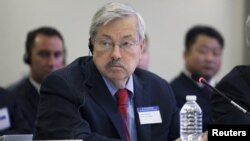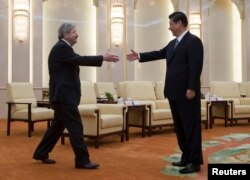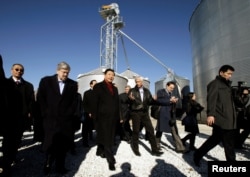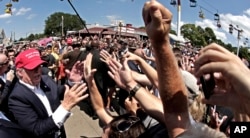In the black-and-white photo from 1985, Chinese President Xi Jinping, then a young official from China's northern Hebei province, stood next to Terry Branstad, who was serving his first term as governor of Iowa. The photo was taken during Xi's first visit to the Unites States during a sister-state exchange program.
Three decades later, Branstad has been nominated to be the next American Ambassador to China by U.S. President-elect Donald Trump, a choice that Beijing has quickly embraced.
"He successfully developed close trade ties with China while serving as chief executive of the Hawkeye State," Trump praised Branstad in a statement Wednesday. "That experience will serve him well as he represents America's interests and further develops a mutually beneficial relationship with Chinese leadership."
Xi, in a message last year congratulating Branstad on becoming the longest-serving governor in American history, said he was impressed by Branstad's "warmth, hospitality, sincerity and friendliness."
"I have known President Xi Jinping for many years and consider him an old friend," Branstad said Wednesday after accepting the position. "I look forward to building on our long friendship to cultivate and strengthen the relationship between our two countries and to benefit our economy."
Branstad was one of the earliest Republican supporters of Trump's presidential campaign.
Experts said having the ears of top leaders from both the U.S. and China is a plus to effectively manage the critical relations between the two countries.
Personal relationship
"Xi Jinping has a kitchen style cabinet, and it's very difficult to know what's going on in his mind," Bonnie Glaser, director of the China Power Project at the Center for Strategic and International Studies, said.
"So if the U.S. ambassador has a personal relationship with Xi Jinping, that can be very, very helpful," Glaser told VOA.
In Washington, the State Department declined direct comment on the selection announced Wednesday by the Trump transition team.
"They are obviously in the process of looking at the relations to some of the key countries and governments around the world," deputy spokesperson Mark Toner said. "As to their intentions, or as to their goals, I'd have to refer you to them."
Branstad is among the first U.S. diplomatic envoys to other nations tapped by Trump.
"It is certainly the counterpoint to the Taiwan phone call," Atlantic Council Senior Fellow Robert Manning told VOA in explaining the timing of the announcement. He was referring to Trump's phone conversation with Taiwan President Tsai Ing-wen last Friday.
Branstad’s appointment were well-received by some of the U.S. industrial leaders.
'Leading advocate for trade'
Paul Schickler, president of Dupont Pioneer, said Branstad would bring “strong existing relationships with China at multiple levels and experience as a leading advocate for trade.”
“These strengths will benefit international commerce and help further advance China’s goal of modernizing its agricultural industry,” Schickler said. Dupont Pioneer is a large seed company that develops and produces high-yielding crop.
Neil Dierks, CEO of the National Pork Producers Council, said this nomination is “good for our industry, good for agriculture and good for rural America.”
But as ambassador, Branstad would also find himself in the middle of an increasingly tense relationship amid U.S.-China trade disputes, and Chinese assertiveness in the South China Sea.
Trump has pledged to use tough trade tactics with Beijing and stop China from "stealing American jobs." He also said he would declare China as a currency manipulator and impose heavy duties on Chinese goods to protect American workers.
“For manufacturers, China stands as one of our largest trade and investment partners, but it is also a major challenge, imposing a range of market-distorting policies and practices that impact manufacturers in the United States,” Jay Timmons, president and CEO of National Association of Manufacturers, said in a statement.
"I think one of the biggest challenges [facing Branstad] is that China's industrial policies and things like the nongovernmental organization law make it very difficult for U.S. firms to operate in China," Manning, a former State Department official, said.
Foreign NGO law
The controversial law managing the operation of foreign nongovernment organizations may also affect American civil society organizations and their Chinese partners to operate in China, according to critics.
"China's assertiveness in the South China Sea will also make it more difficult to establish a relationship that's more cooperative than competitive," Manning added.
Congressional members and human rights advocates called on Branstad to address thorny issues, including promoting fundamental freedom and rights.
Republican Congressman Chris Smith of New Jersey told VOA Mandarin there is strong support for a “robust and serious human rights engagement with China.”
Speaking after a bipartisan Congressional-Executive Commission on China (CECC) hearing Wednesday that examined the human rights situation in China, Smith said there should be sanctions in place to punish Chinese human rights violations, which include forced abortions and religious prosecution.
Democratic Congressman Tim Walz of Minnesota, Iowa’s neighboring state, told VOA that in addition to human rights, issues such as genetically modified organisms and trade are “deeply concerning to us in the Midwest.”
Pastor Bob Fu, founder and president of ChinaAid, a nonprofit Christian human rights organization, said he hoped Branstad’s appointment could “set up a new course” in addressing imminent issues, including the protection of rights defenders and labor activists in China, and not “kowtow” to China’s economic power.
Iowa farm products
China is a crucial export market for the Midwestern state of Iowa, which is a major producer of pigs, soybeans and corn.
Branstad is no stranger to the U.S.-China Governors Forum, which has gathered regularly for years to promote practical cooperation between American and Chinese leaders from states and provinces.
Since leading his first delegation to Hebei Province in 1984, Branstad has led six trade missions to China as Iowa governor and met with numerous provincial governors, ministerial leaders and local officials.
Mandarin Service reporters Teng Xu, Beibei Su contributed to this article.








